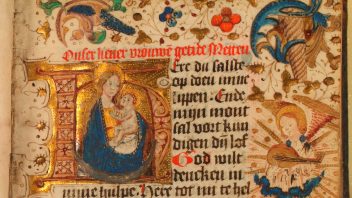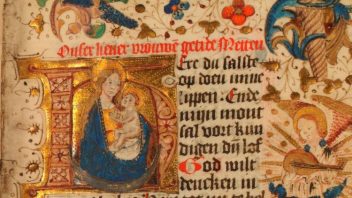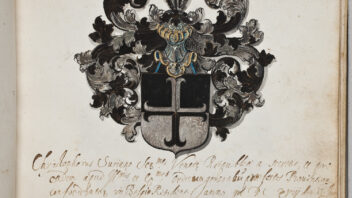Four new volumes in the MVN series online
Four new volumes in the Medieval Collection Manuscripts from the Low Countries (MVN) series have been presented on Monday, Oct. 2, 2023. The new volumes, appearing in digital form, are:
Het Handschrift-Van den Stock (Brussels, KBR, II 116) is a thin but surprising volume. The East Flemish copyist most likely created it for his own use (circa 1450). It contains sixteen texts, including a description of table manners, a portion from the vers-Lucidarius, rhyming proverbs, rhymed penitential psalms and the sproke Van tijtverlies van Bouden van den Lore. The texts indicate that the Flemish compiler was concerned not only with his soul’s salvation, but also with correct social manners. The manuscript is named after a sixteenth-century possessor who noted his name in a lower margin: Olivier vanden Stock.
The Handschrift-Serrure (Brussels, KBR II 144) is a paper manuscript created in stages during the sixteenth and seventeenth centuries, probably in the south of the Duchy of Gelre. It contains as many as 68 short texts, including songs, proverbs, minstrelsy, sermons, parodies of recipes and also some Latin texts. The second of the three codicological volumes contains the Straßburger Rätselbuch. The highly varied text collection seems to originate from a student environment and has been characterized by Herman Pleij as a “modest Carmina Burana variant in the vernacular.
The Blauwe Schuit manuscript (The Hague, KB, 75 H 57). With comic tales, burlesque humor and mockery alongside refined courtliness, minstrelsy and German-inflected poetry, this varied manuscript, written shortly after 1440 and sadly mangled in many respects, is at the same time a fascinating echo of a then already waning courtly culture, as the starting point of a long-lived urban phenomenon: the Blue Barge. The texts themselves, the enigmatic notes and blunders of the two copyists, together with the intriguing provenance from Egmond monastery make this paper booklet a unique object of study for medievalists and literary historians.
The Heber-Serrurecodex (Ghent, University Library, Hs. 1374) contains mainly ethical-didactic rhyme texts. The manuscript was produced and extensively corrected in stages by one copyist (emergency name Second Partie copyist). Several other products of this copyist have also survived. The codex was probably produced at the end of the fourteenth century in the Carthusian monastery of Herne. The manuscript contains a large number of unica, including large excerpts from the Spiegel historiael, and some rare strophic poems, namely the Rinclus, all four Martijn poems and Der kerken claghe.




